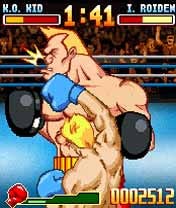Trending
Opinion: How will Project 2025 impact game developers?
The Heritage Foundation's manifesto for the possible next administration could do great harm to many, including large portions of the game development community.
Glu Mobile have recently opened a studio in Beijing, China, and have just launched a mobile game based one of the summer's most anticipated (and debated) films, Transformers. Games On Deck talks to Glu Mobile CEO Greg Ballard about these events and the company in general.

 Glu Mobile have recently opened a studio in Beijing, China, and have just launched a mobile game based one of the summer's most anticipated (and debated) films, Transformers. Games On Deck talks to Glu Mobile CEO Greg Ballard about these events and the company in general.
Glu Mobile have recently opened a studio in Beijing, China, and have just launched a mobile game based one of the summer's most anticipated (and debated) films, Transformers. Games On Deck talks to Glu Mobile CEO Greg Ballard about these events and the company in general.
Games On Deck: Can you give us a little background on Glu Mobile?
Greg Ballard: Glu was actually started in 2001 by a group of people who came from Electronic Arts. They were looking for the next big thing, they talked to a venture capitalist and used the money to enter the mobile games business. In those early years there wasn't a lot to say about the business, but they released some titles, got some traction in the marketplace and then in late 2003 I joined the company.
The company had been focused mostly in the United States and mostly on sports when I joined, and we made the decision fairly early on to broaden our portfolio beyond that, and that we were going to become an international company. So we embarked upon an effort to find companies that would allow us to do that, especially in Europe. In late 2004 we acquired a studio in London, which not only gave us access to development but also distribution in Europe.
In 2006 last year we acquired a company in the UK called iFone, which gave us access to a lot of very high quality brands that had been perhaps underexploited by iFone, as they were not an international company, and so we were able to take those brands and leverage them on a worldwide scale.
We've gone from been not even in the top 50 of companies in an industry that had barely 200, 300 companies to a company that ranks at number 2 or number 3 in the rankings on a worldwide basis in a massive industry in a really rather short period of time.
GOD: Can you describe your studios?
GB: We have three studios today, and a fourth just beginning. We've got our original studio in San Mateo, we've got a studio in London, a new studio which we just announced in Beijing, and we've got a studio in São Paulo, Brazil. It mostly does porting for the local market currently but there are the beginnings of some original development there too.
Each of those studios has their own expertise, but they're all pretty versatile. We have in each of the studios multiple teams and each team is likely to work on multiple projects across each year.
GOD: Why open a studio in China?
GB: In some respects you could change that question to "Why did it take you so long to open a studio in China?" As several of our competitors have done similar things, not just in China but in India and in Eastern Europe.
Much of what we do has been semi-automated over the years. We've got lots of tools and development expertise in a platform sense that allows us to rapidly port to up to a thousand handsets. The ability to do that in a routine, systematic way is something that we wanted to make sure that we could make portable, so we could export that to another studio if we needed to. So we've made sure that London and San Mateo used the same tools and same platforms. So while other companies have gone to China and India to try and reduce their costs, they haven't been using the same sort of development environment were, and they've been looking to just sort of get cheap labour.
Well, we already have some of the least expensive ports in the world, so we haven't been forced by competitive pressures to move into China before we were ready to. Now we've got this system and platform ready to go where we can take it to a studio in China and train Chinese employees to use it and be reasonably comfortable that the ports that will result will be the highest quality possible and also very low cost, because they're using our system.
What this allows us to do potentially with our ports is turn them into the lowest cost possible. So if we spend $200, $250 dollars per port today, with the Chinese studio we could be spending as little as $50.
GOD: Do you have interest in trying to break into the Chinese market?
GB: We do have some interest in that. We're actually in the Chinese market today, but it's not a particularly large market currently when you compare it to the US, Europe, or even Australia and New Zealand. We have faith that it will grow and it's certainly part of the reason we wanted to start a studio in China, so we could develop Asian product lines which are obviously quite different from the western styles of games. I think this could help us be more accepted in Korea, Thailand, Taiwan and Malaysia.
So the Chinese studio is primarily to develop globally-minded titles but is also to have a subset of its employees working on Asian titles.
GOD: Tell us about the new Transformers title.
GB: We're really pleased about how it turned out. The thing about Transformers that is a little bit different about any other brand that you can imagine, is that it's got an almost, and I say this a positive fashion, "cultish" fanbase. Their standards for anything Transformers related are so high that we had a lot of concern to create a product that delivered to their sensibilities and on their expectations.

Transformers
From what I've seen of the movie it seems to be exceeding expectations of the fans too, so that bodes really well.
What we liked about the game, movie and the brand is that it's a brand that's larger than a movie, the movie is just an event as part of brand. It's not Mr. And Mrs. Smith which we did last year which was just a one-off movie. So, we're quite excited about the product. In my mind it's as good an execution of a launch as any product we've been involved with.
GOD: Film licenses seem like a good choice to publishers as they're very obvious on deck. But how do you make sure you select, and get, the right kind of license?
GB: At Glu we've done a lot of research on this, and we were convinced that Transformers, for example, would be a huge brand. There's no one single formula for doing it, but it does involve a lot of rigour. There's a lot of data out there from third-party sources about what categories are working and which brands perform best, what's selling, what isn't, and we have people that spend a lot of time looking at that data .
GOD: What about original IP?
GB: We are, and we've always been, fans of original IP, and in the early days, we had a fair number of titles such as Shark Hunt in our catalogue that did extremely well. In the past couple of years though we've actually gotten better at doing original IP. In part because we've gotten better at creating products in general, and also in part because we've been successful with developing licensed brands and we've been able to bring that credibility of being a leading company in the marketplace to original IP. So if people see it's a game from Glu it makes a difference.

Super K.O. Boxing
We've launched very successful titles like Super K.O. Boxing, and these games have done very well for us, but it's not clear that they could have done as well for someone else who doesn't have the traction in the marketplace that we do. As much as we like original IP, we're not sure a company could do only original IP. A company has to have a broader strategy than that to be successful in bringing a lot of titles to the marketplace.
GOD: Where do you see the future of the mobile games industy?
GB: I think we're all guessing. Some people see it evolving into a social network orientated business, others see it becoming an extension of the casual games market.
I don't know if any of those things are going to happen any time soon, but one of the things I know is that it has grown rapidly, but it has grown slower technologically than people expected. For example, people have been saying multiplayer is going to take off for years now and it still hasn't happened- consumers don't care about it, they'd rather play Zuma alone while waiting for a bus. The same for 3D. While 3D is important for this business, it hasn't changed things the same way it did for the PC business, or the console business. In fact, people still want to play very simple games, like Diner Dash.
I'm kind of a contrarian in that sense. I do think the industry has space to evolve in all of the ways that people think it will, but I think it'll happen three or four years slower than everyone else. And that's fine!
Read more about:
FeaturesYou May Also Like